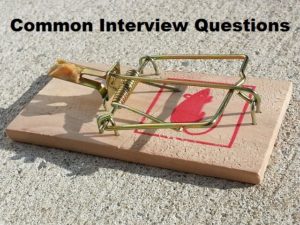
Wrong answer! You lose. Now leave.
In an interview you are asked, “What are your weaknesses?”
You reply, “I really don’t have any weaknesses.”
Wrong answer. Every religion I know of says that you have weaknesses. Don’t fight it. Come up with one.
“My biggest weakness is my cheerfulness and high character.”
That just made everyone who heard it sick.
“I like to humiliate people with sexually explicit jokes.”
That weakness will get you escorted out of the building by security.
“As a project manager I have a tendency to give people too much freedom. When they tell me they are just a little behind schedule, my tendency is to believe them even when I know deep in my heart they are in trouble. I have to constantly remember to dig into problems my people are having and make sure they get help early. That way we can hit all of our deadlines. I’ve gotten very good at it.”
That one is true. It is my personal weakness. It is the virtue of not micromanaging, that I take too far. Did you notice that I mentioned what I have learned to do to overcome that weakness?
When you are asked, “What are your weaknesses?”, be honest. What is a strength that you take too far? That’s a good place to start. The most important part of your answer is to show that you have learned how to cope with your weakness. What do you do to make sure that the weakness DOES NOT CONTINUE to be a problem?
Don’t be syrupy and sweet. Don’t deny that you have problems. Honestly evaluate your performance. Take a strength that you over-exercise. Explain it. Explain what you do to keep it under control. When they know you have figured out how to compensate, they will accept it as self-realization instead of weakness.
Build up your weaknesses until they become your strong points. (Knute Rockne)
Something To Do Today
Make a list of virtues you take too far. Add to that list what you do to compensate.
Take your strongest weakness into your next interview, along with its solution.
————————–
Tomorrow: What do we have to pay you?
Later: Why are you leaving your job?
Will you do anything we ask?
Where else are you interviewing?
Should you tell them where else?
Why don’t they give you an answer, Yes or No?


